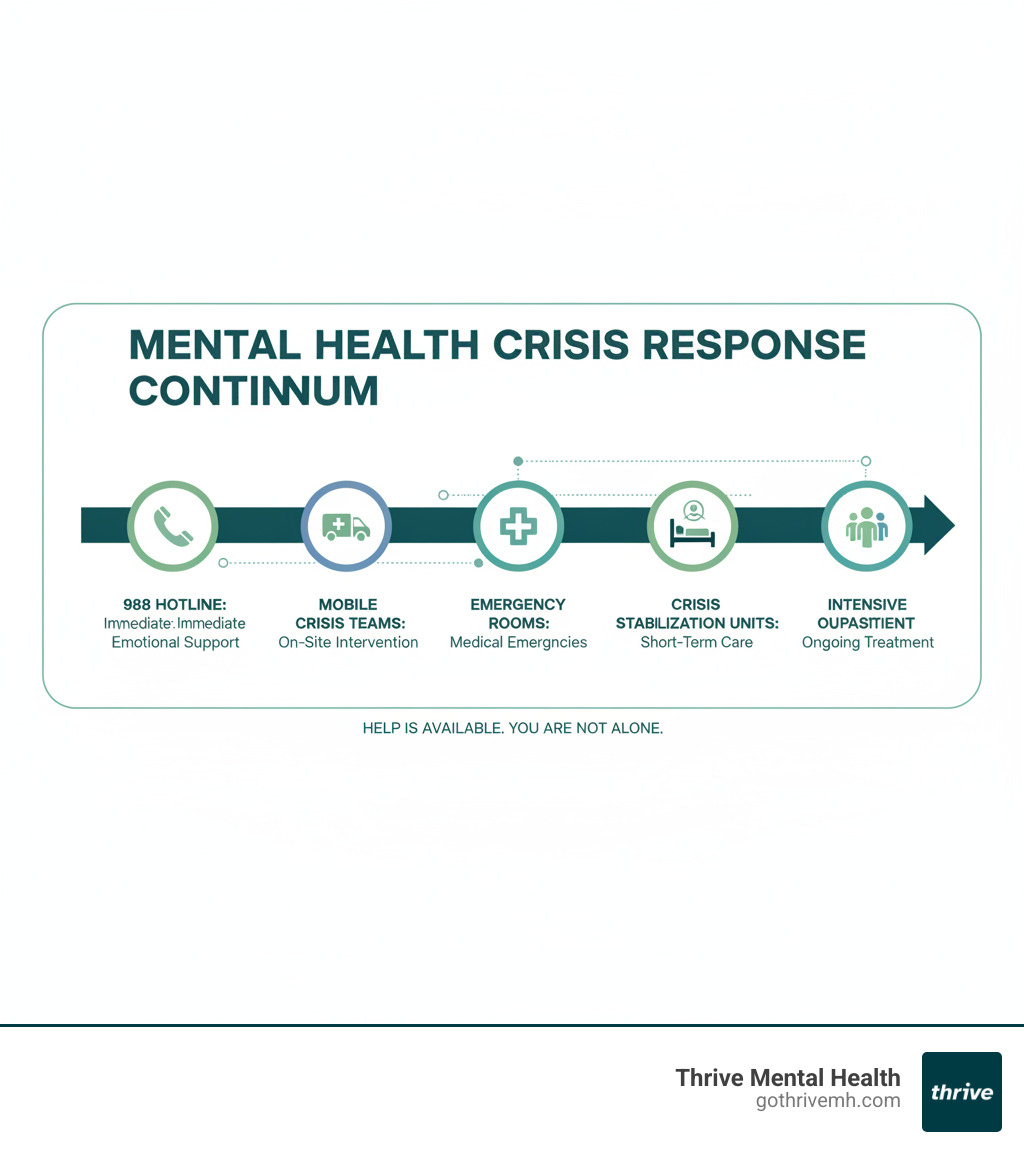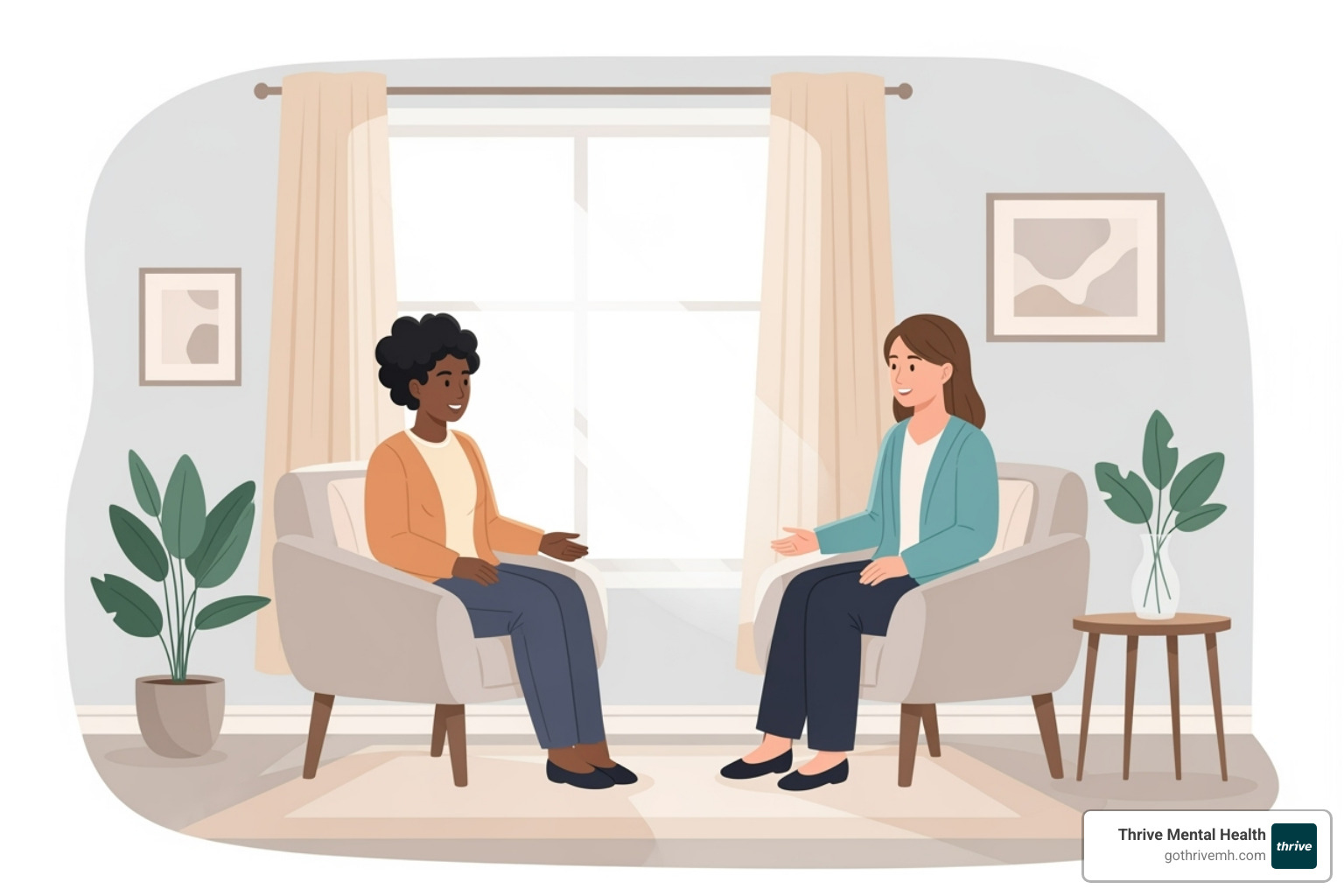Emergency Mental Health Care Made Easy: Crisis Services You Can Trust

Crisis Mental Health Emergency Services: 24/7 Essential Support
When Every Second Counts: Finding the Right Help in Mental Health Emergencies
Crisis mental health emergency services are specialized support systems that provide immediate help to someone in severe psychological distress. These services, including 24/7 hotlines and mobile crisis teams, can be life-saving.
If you or someone you know is in immediate danger, here’s what to do:
- Call/text 988 – Suicide & Crisis Lifeline (free, confidential, 24/7)
- Call 911 – If there’s immediate physical danger or a medical emergency
- Text “HOME” to 741741 – Crisis Text Line for text-based support
- Contact local mobile crisis teams – In Florida, you can often connect with these teams by calling 211 or your local crisis center.
- Go to the nearest ER – If immediate medical attention is needed
Mental health crises can happen to anyone at any time. Whether it’s overwhelming anxiety, severe depression, or suicidal thoughts, the good news is that free, immediate help is available. Services like the 988 Lifeline provide trauma-informed, culturally appropriate support to anyone in the US and Canada, with mobile crisis teams bringing professional help directly to thousands of people’s homes each year.
I’m Anna Green, LMHC, LPC, Chief Clinical Officer at Thrive Mental Health. With years of experience in crisis intervention, I’ve seen how the right intervention at the right moment can transform someone’s darkest hour into the beginning of their healing journey.

Essential crisis mental health emergency services terms:
What is a Mental Health Crisis? Recognizing the Signs
A mental health crisis is a deeply personal experience of overwhelming distress. As professionals emphasize, a crisis is often “self-defined by the individual calling for support.” This means if you feel you are in a crisis, you are.
It occurs when someone’s emotional state interferes with their ability to function safely, potentially leading to self-harm, harm to others, or an inability to care for themselves. Crisis mental health emergency services are essential when you experience:
- Suicidal thoughts or behaviors
- Overwhelming, uncontrollable anxiety
- Self-harming thoughts or actions
- Severe depression that makes daily life feel impossible
- Psychotic or distorted thinking (delusions or hallucinations)
- Difficulty coping with unbearable distress
- Substance use that is escalating to dangerous levels
Crisis vs. Emergency: Knowing When to Act
Understanding the difference between a crisis and an emergency helps you choose the right response.
It’s a crisis when you feel you can no longer cope, but aren’t in immediate, life-threatening danger. This is a critical time to seek urgent support to prevent the situation from worsening. Key signs include:
- Feeling out of control of your emotions or reality.
- Thoughts of self-harm, even without a specific plan.
- Increased use of alcohol or drugs to cope.
- Isolating from others and withdrawing from usual activities.
- Erratic or unusual behavior that is out of character.
- Overwhelming emotional distress that feels unmanageable.
For more insight into how past experiences can contribute to these feelings, see our Beginner’s guide to understanding trauma.
It’s an emergency when the situation is life-threatening and requires immediate action to ensure safety. This is when the risk of serious harm is imminent. Call 911 immediately if you see:
- Immediate risk of harm, such as an active suicide attempt or a specific, imminent plan.
- Threatening violence toward others.
- Medical distress from self-injury or an overdose.
- Inability to care for basic needs (eating, bathing) to a life-threatening degree.
In an emergency, a person may be severely disoriented or out of touch with reality. Do not wait or leave the person alone—call 911 immediately.
Your First Move: Immediate Steps in a Mental Health Emergency
When someone is in a mental health emergency, your quick, thoughtful response can save a life. You don’t need to be a professional to help.
CALLOUT BOX: If you or someone you know is in immediate danger or thinking about suicide, call or text 988 now. You are not alone.
Here’s what you can do:
- Stay Calm and Be Present: Take a deep breath. Your presence is powerful.
- Assess for Safety: Is anyone in immediate physical danger? Are there weapons nearby? This helps you know if you need to call 911.
- Listen Without Judgment: Let the person know you’re there for them. Avoid platitudes like “think positive.” Instead, say, “I’m here with you” or “Tell me what’s happening.”
- Remove Means of Harm: If you can do so safely, quietly secure medications, knives, or other dangerous items.
- Stay With the Person: Never leave someone alone during a mental health emergency until help arrives or the immediate crisis passes.
Balancing urgency with compassion is key. For more detailed guidance, NAMI provides an excellent guide to navigating a crisis.
When to Call 911 vs. a Crisis Line
Calling 911 isn’t always the best first move. While essential for physical emergencies, police and paramedics may not have specialized mental health training.
- Call 911 when there is immediate physical danger: someone is actively self-harming, threatening violence with a weapon, has overdosed, or is dangerously disoriented.
- Call or text 988 when the crisis is primarily emotional or psychological: suicidal thoughts without an active attempt, severe anxiety, or psychological distress without immediate physical risk.
Specialized crisis mental health emergency services like 988 are designed for de-escalation, not enforcement. Unfortunately, people with mental illness are disproportionately involved in police shootings, and jails often house more individuals with serious mental illness than hospitals. To address this, many communities in Florida are developing Crisis Intervention Teams (CIT), which pair mental health professionals with trained officers to respond with empathy. If you must involve the police, NAMI offers helpful tips for calling police in a mental health emergency.
What to Have Ready When You Call for Help
Being prepared helps responders act faster. Have this information ready:
- Your exact location.
- The person’s name and basic description.
- A description of what is happening right now.
- Mention of any weapons or dangerous items.
- Relevant mental health history, if known (diagnoses, medications, past hospitalizations).
- Your relationship to the person.
- Your contact information.
Don’t worry if you don’t have all the details. The most important thing is to make the call.
Your Guide to Crisis Mental Health Emergency Services: Pathways to Healing

When you’re in emotional pain, a network of crisis mental health emergency services is ready to help. These services are available 24/7, free, and confidential. Think of them as emotional first responders who meet you where you are—whether by phone, text, or in person.
National and Local Crisis Hotlines: Your Lifeline, Anytime, Anywhere
Crisis hotlines are often the fastest path to relief, connecting you with trained counselors and peer specialists who understand what you’re going through.
The 988 Suicide & Crisis Lifeline is the cornerstone of crisis support in the US and Canada. It’s a gateway to immediate, trauma-informed care for anyone experiencing suicidal thoughts, anxiety, depression, or substance use struggles. When you reach out, a real person listens without judgment, helps you process your feelings, and can create a safety plan with you.
Text-based support offers the same professional care in a format that may feel more comfortable. For non-crisis distress, warmlines offer peer support from people with lived experience of mental health challenges. If you’re struggling with anxiety, our anxiety support online resources can also provide valuable guidance.
Many states and local communities also offer their own crisis lines. In Florida, for example, dialing 211 can connect you to a wide range of local crisis services and resources.
Mobile Crisis Teams: Bringing Expert Help Directly to You
Mobile crisis teams bring compassionate, professional help to your doorstep. As NAMI explains, a mobile crisis team consists of mental health professionals who respond to emergencies outside of a clinical setting. Their goal is to keep you safe in your community and out of hospitals or jails whenever possible.
These teams, often including social workers and nurses, provide immediate assessment and de-escalation. In Florida, mobile response teams are a key part of the behavioral health system, designed to reduce emergency room visits and police involvement. Many are available 24/7 via telephone, with mobile units dispatched during peak hours, promising a rapid response to your call.
Specialized Crisis Mental Health Emergency Services for Diverse Communities
Healing isn’t one-size-fits-all. Specialized crisis mental health emergency services offer culturally competent support for specific communities.
- Veterans: The Veterans Crisis Line provides 24/7 support from professionals who understand the unique challenges of military service.
- LGBTQ Youth: The Trevor Project is a leading crisis intervention and suicide prevention service for LGBTQ young people.
- Young People (ages 5-20): Kids Help Phone offers confidential, 24/7 support via phone (1-800-668-6868) or text (CONNECT to 686868).
- Indigenous Peoples: The Hope for Wellness Help Line offers culturally-grounded support for First Nations, Inuit, and Métis Peoples (1-855-242-3310).
- Gender-Specific Support: Many regions offer dedicated helplines for men, women, and all genders, connecting callers with trained navigators.
- Families and Friends: Many crisis lines also offer education, outreach, and consultation for those supporting a loved one, because caregivers need support, too.
After the Crisis: Stabilization, Treatment, and Planning for the Future

Getting through a crisis is a courageous first step. The healing journey continues long after the immediate danger passes, moving from surviving to thriving. This is your opportunity to build skills and strategies for lasting wellness.
From Crisis Stabilization to Ongoing Treatment
Crisis stabilization services bridge the gap between an emergency and long-term recovery. These short-term programs help you regain your footing without full hospitalization. Crisis stabilization units offer a safe, structured environment to work through the immediate aftermath of a crisis. Following an emergency room visit, connecting to ongoing support that addresses the root causes of your distress is essential.
This continuity of care is vital for effective recovery. It’s not enough to just get through the crisis; you deserve support that equips you for future challenges. Understanding the benefits of utilizing mental health services highlights why this next step is so important.
Higher Levels of Care: IOP and PHP
Sometimes, weekly therapy isn’t enough. More intensive programs can build lasting recovery skills while you continue living your life.
- Intensive Outpatient Programs (IOP) offer multiple therapy sessions each week, providing significant support while you maintain work, school, or family commitments. You get intensive healing without putting your life on hold.
- Partial Hospitalization Programs (PHP) provide daily, hospital-level care that lets you sleep in your own bed at night. PHP is ideal for stepping down from inpatient care or when you need more support than traditional outpatient services.
Thrive Mental Health’s virtual and hybrid programs have a strong presence in Florida, offering flexible care that includes evening options to fit your schedule. We also proudly serve clients in South Carolina, Indiana, Arizona, and California. Our guide on PHP vs IOP can help you understand the differences.
Creating a Proactive Crisis Plan
A mental health crisis plan is a personalized roadmap that empowers you to handle future difficulties. As NAMI’s resource on how to prepare for a potential crisis explains, this preparation is invaluable. Your plan should include:
- Personal triggers and early warning signs.
- Coping strategies that work for you.
- Contact information for your support network (friends, family) and professional team (therapist, doctor, crisis lines).
- Medication details (names, dosages, prescribers).
Creating this plan is an active step toward building resilience and taking control of your mental health.
Navigating Insurance for Mental Health Care: Open up Your Benefits, Access Quality Care

Here’s some good news: while crisis mental health emergency services like the 988 hotline are completely free, many insurance plans also cover ongoing treatment options that can help prevent future crises. Understanding your benefits doesn’t have to be overwhelming – and it’s often much better than you might expect.
The reality is that most major insurance providers now recognize mental health care as essential. This means your plan likely covers intensive outpatient programs and partial hospitalization services that can provide the deeper support you need after a crisis.
Major insurers we work with include Cigna, Optum, Florida Blue, Aetna, and UnitedHealthcare. Each of these companies has made significant commitments to mental health coverage, often providing substantial benefits for both crisis intervention and ongoing treatment.
The key difference you’ll want to understand is in-network versus out-of-network coverage. When you choose an in-network provider like Thrive Mental Health, your insurance company has already negotiated rates with us. This typically means lower copays, smaller deductibles, and better overall coverage for you.
For our friends in Florida, Indiana, and California, your state regulations provide additional protections for mental health coverage. Florida has strong parity laws ensuring that mental health benefits are treated equally to medical benefits, making quality care more accessible.
Verifying your benefits used to be a headache-inducing process involving long phone calls and confusing explanations. We’ve streamlined this completely. Our online verification takes about two minutes and shows you exactly what your plan covers – no surprises, no hidden fees, no obligation to move forward.
If you’re exploring Medicaid options in Florida, the state’s program has expanded coverage significantly in recent years. Our guide to Medicaid covered therapy breaks down what services are typically covered and how to access them.
The bottom line? Don’t let insurance concerns stop you from getting the care you need. Most people are pleasantly surprised by how much their plan actually covers. And even if your benefits aren’t perfect, investing in your mental health now can prevent much more costly crises down the road.
Frequently Asked Questions about Crisis Mental Health Emergency Services: Get Your Answers Fast
When you’re facing a mental health emergency, questions flood your mind faster than answers. We get it – and we’re here to clear up the confusion with straightforward answers to the most pressing questions about crisis mental health emergency services.
What is the fastest way to get mental health help in a crisis?
Call or text 988 – it’s that simple. The Suicide & Crisis Lifeline connects you with trained professionals who provide free, confidential support 24 hours a day, 7 days a week. You don’t need insurance, an appointment, or even your real name.
If someone is in immediate physical danger – like actively attempting suicide, threatening violence, or severely injured from self-harm – call 911 right away. But for emotional crises, suicidal thoughts, or overwhelming distress without immediate physical risk, 988 is your fastest route to specialized mental health support.
The beauty of 988? You’ll speak with someone who actually understands mental health crises, not just medical emergencies. They’re trained in de-escalation and can help you create a safety plan on the spot.
Can someone be forced into treatment during a mental health crisis?
This is one of the most frightening questions families ask, and the answer isn’t black and white. Involuntary commitment can happen, but only under very specific circumstances – and the laws vary significantly from state to state.
Generally, involuntary commitment applies when a person is deemed an immediate danger to themselves or others due to a mental illness. In Florida, this process is known as the Baker Act. It allows for involuntary examination for up to 72 hours under specific criteria.
The process is legal and involves multiple safeguards, including evaluations by mental health professionals and court hearings if a longer hold is required. It’s genuinely used as a last resort when all other options have been exhausted and safety is the primary concern.
Most crisis mental health emergency services work hard to avoid involuntary commitment by helping people create voluntary safety plans and connecting them to appropriate treatment. The goal is always to keep people in their communities when it’s safe to do so.
Are crisis services confidential?
Yes, crisis hotlines like 988 are confidential – but there are important exceptions you should know about. Your privacy is protected, and you don’t have to give your real name or personal details if you don’t want to.
However, confidentiality has limits when imminent risk of harm exists. If you tell a crisis counselor that you’re about to hurt yourself or someone else, they may need to take action to ensure safety. But here’s the key difference from other services: they work with you first to create a safety plan whenever possible.
The goal isn’t to “get you in trouble” – it’s to keep you alive and safe. Crisis counselors are skilled at finding solutions that respect your autonomy while protecting your wellbeing. They understand that trust is essential, and they’ll be transparent about what they need to do and why.
For ongoing treatment after a crisis, services like our intensive outpatient programs maintain strict confidentiality standards while providing the structured support many people need for lasting recovery.
Conclusion
Navigating a mental health crisis can feel overwhelming, but you are not alone. Lifelines are available, from the immediate support of 988 to specialized mobile crisis teams. These crisis mental health emergency services exist because your life matters, and help is always within reach.
Knowing the right number to call—988 for emotional support or 911 for physical danger—can save a life. But surviving a crisis is just the beginning. The journey to recovery requires ongoing support, which is where structured programs like our Intensive Outpatient Programs (IOP) and Partial Hospitalization Programs (PHP) make a difference. They help you build the resilience and coping skills needed for long-term wellness.
Taking the first step is an act of courage. At Thrive Mental Health, we are proud to offer accessible, compassionate care to residents of Florida and other states. Our virtual and hybrid programs, including evening options, are designed to fit your life.
Your story doesn’t end with a crisis—it transforms through connection, care, and hope.
Ready for support? Thrive offers virtual and hybrid IOP/PHP with evening options. Verify your insurance in 2 minutes (no obligation) → Start benefits check or call 561-203-6085. If you’re in crisis, call/text 988.
For a broader understanding of mental health support, explore our Vital Mental Health Services page.
FAQ Schema Markup (for implementation by developer):
{
"@context": "https://schema.org",
"@type": "FAQPage",
"mainEntity": [
{
"@type": "Question",
"name": "What is the fastest way to get mental health help in a crisis?",
"acceptedAnswer": {
"@type": "Answer",
"text": "The fastest way is to call or text 988, the Suicide & Crisis Lifeline. They provide free, confidential, 24/7 support. If there is immediate physical danger, call 911."
}
},
{
"@type": "Question",
"name": "Can someone be forced into treatment during a mental health crisis?",
"acceptedAnswer": {
"@type": "Answer",
"text": "Involuntary commitment laws vary by state. In Florida, for example, the Baker Act allows for involuntary examination if a person is deemed an immediate danger to themselves or others due to mental illness. This is a legal process used as a last resort to ensure safety."
}
},
{
"@type": "Question",
"name": "Are crisis services confidential?",
"acceptedAnswer": {
"@type": "Answer",
"text": "Yes, crisis hotlines like 988 are confidential. They will only break confidentiality if there is an imminent risk of harm to you or someone else, and even then, they work with you to create a safety plan first whenever possible."
}
}
]
}